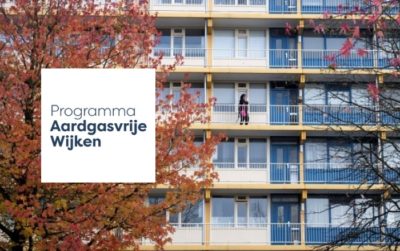All 355 municipalities in the Netherlands have received an invitation to participate in a new round of ‘proeftuinen aardgasvrije wijken’, the testing grounds program for natural gas-free neighbourhoods. The selected municipalities will receive a financial contribution from the Dutch government to make existing homes and other buildings free of natural gas via a neighbourhood-oriented approach.
PAW (Natural Gas-free Neighbourhoods program) with stricter selection criteria
One of the agreements from the Climate Agreement is that we gradually make districts free of natural gas through a neighborhood-oriented approach. Municipalities are in charge of completing this assignment. Since the end of November, registration for the second round of “testing grounds for natural gas-free neighborhoods” has been opened. Municipalities can submit an application to be selected until 1 April 2020. The selection criteria for the new round have been tightened considerably, which should lead to a higher quality of applications. RVO (Netherlands Enterprise Agency) emphasizes that affordability for residents is paramount.

A neighbourhood-oriented approach
Affordability for residents
We have already seen several thermal projects in which little attention has been paid to the affordability for residents. Yes, the business case for the thermal network fits the supplier, but the business case for residents is missing. So now it is up to the municipalities who want to participate in the PAW to make it work both ways.
How do you approach this? How to get insight into the residents perspective? It is clear that above all one must find out the most interesting options for residents and other building owners in the neighbourhood and if that is a collective facility, whether it will also be widely supported. Give the residents insight so that they themselves can make a better choice on what the most favourable route to natural gas-free is. Support them by providing them with their own business case!

Affordability for residents
COLONY-model
TheEarlybirds have developed a model that is perfect for an approach like the PAW. Per address, the COLONY model calculates the most cost-effective intervention: which investment in which type of heating technology and insulation type yields the most savings. Also, a very practical outcome is the “competitive heating price”, the tipping point at which there is no financial difference between a collective or an individual energy solution. In short, the affordability for residents becomes a lot more transparent!

